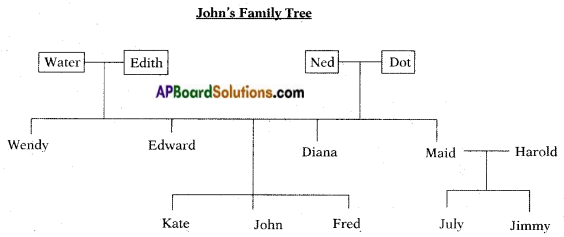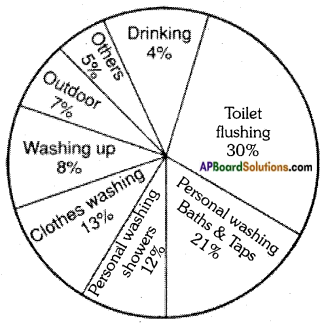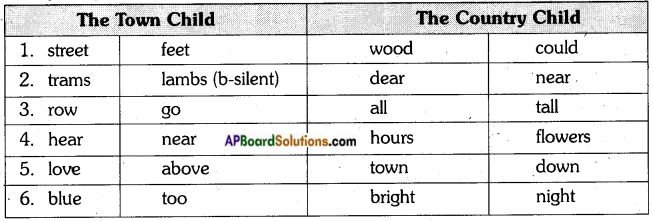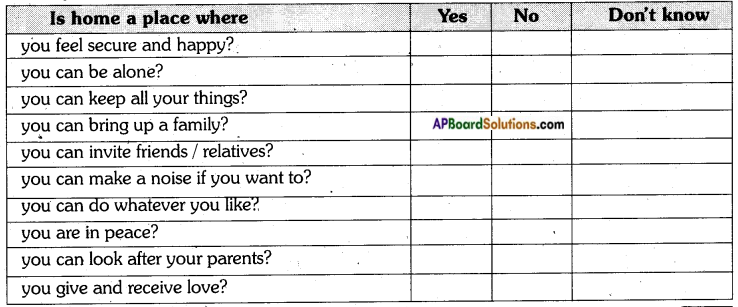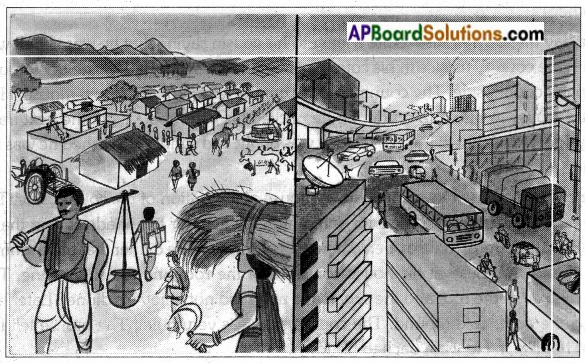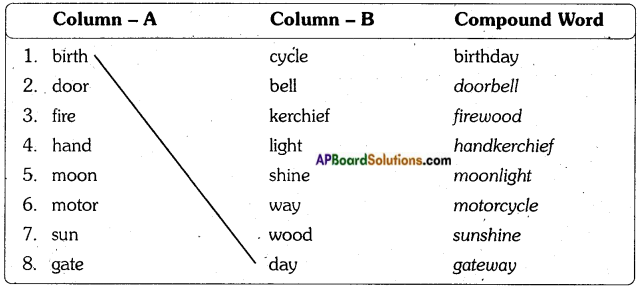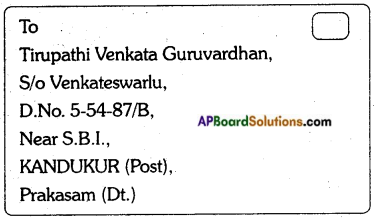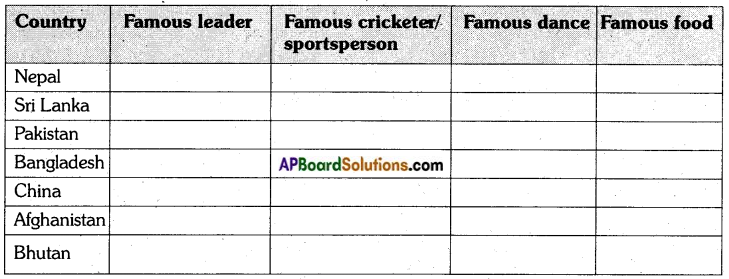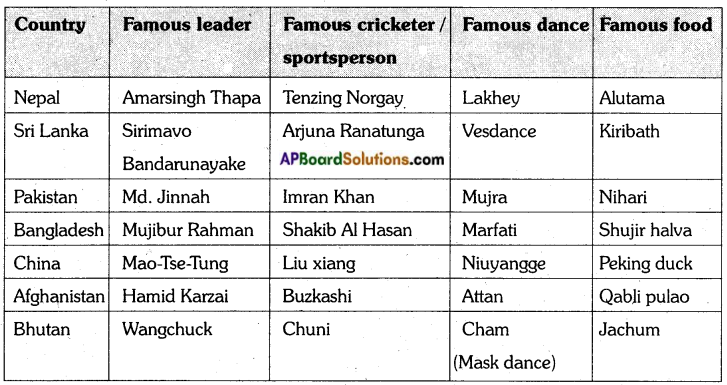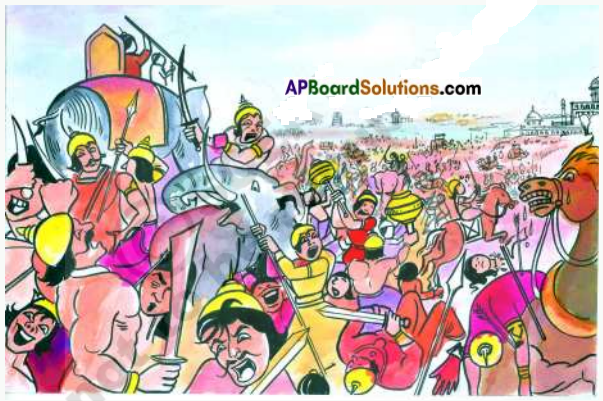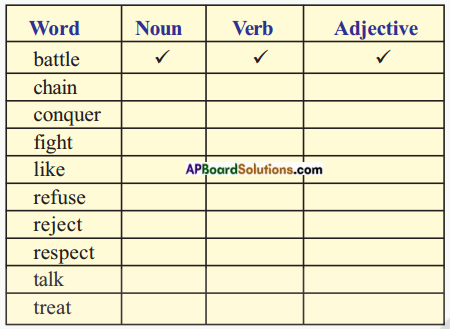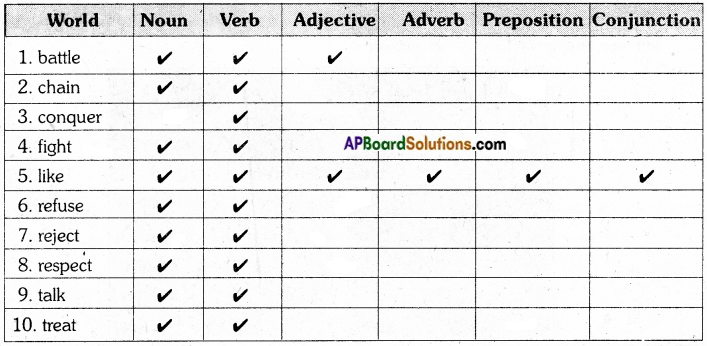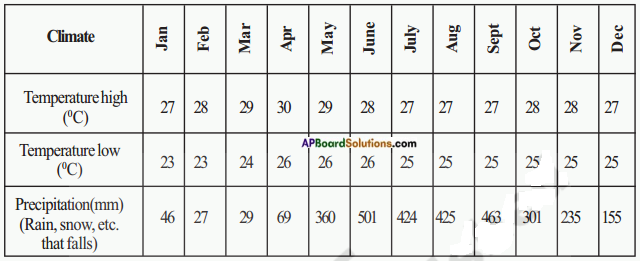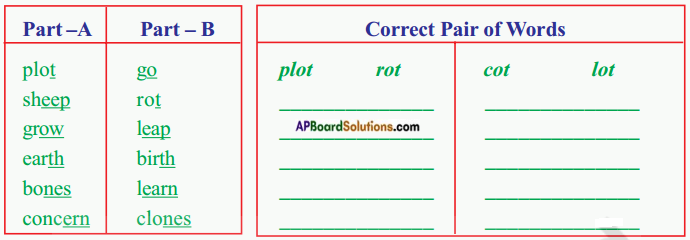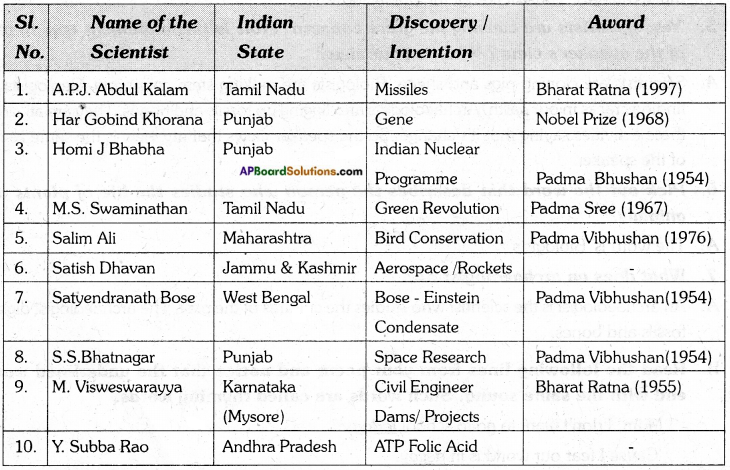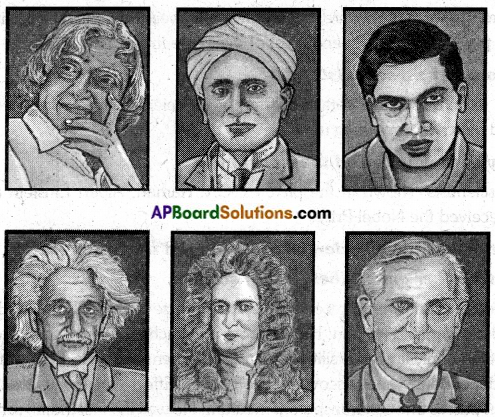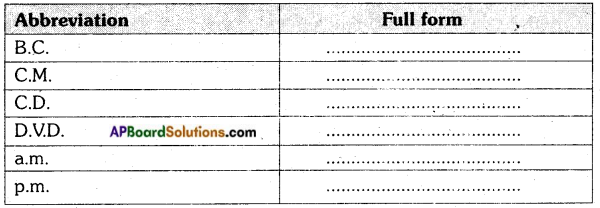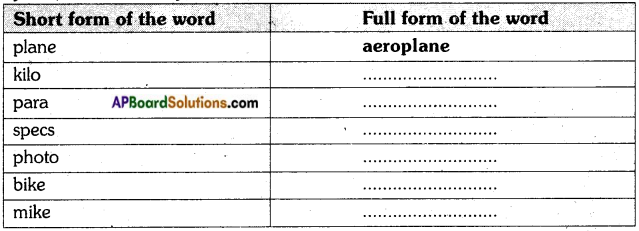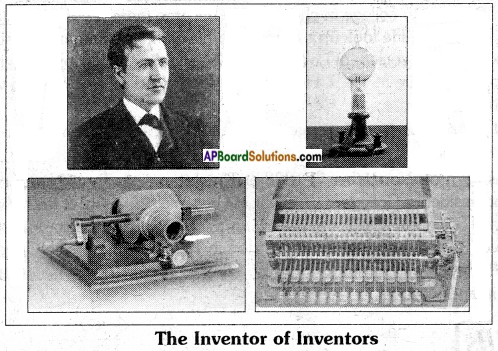AP State Syllabus 7th Class English Important Questions Unit 4
7th Class English Important Questions Unit 4
Section – A: Reading Comprehension
A. Reading
1. Read the following passage.
Tenali Raman was a poet and jester in the court of King Krishnadevaraya of Vijayanagar. He was famous for his wit and intelligence. This interesting play provides an example of his wit.
Now answer the following questions.
a) What was Tenali Raman?
b) Which kingdom did King Krishnadevaraya rule?
c) What do you call a person who amuses people?
d) Two qualities of Tenali Raman were mentioned in the passage. What are they?
e) What are the people in the court called?
Answer:
a) Tenali Raman was a poet and jester.
b) Krishnadevaraya ruled Vijayanagara kingdom.
c) Jester
d) He was famous for his wit and intelligence.
e) Courtiers
![]()
2. Read the following passage.
One day, Raja Krishnadevaraya and his courtiers watch as an artist shows his paintings to the king. The king and most of his courtiers are impressed with the paintings. However, one of the courtiers, Tenali Raman, looks displeased.
Now answer the following questions.
a) Why did the artist come to Krishnadevaraya’s court?
b) What was the reaction of Raja and courtiers when they saw the paintings?
c) Why were the king and the courtiers impressed with the artist?
d) Who was Tenali Raman?
e) How did Tenali Raman react after looking at the paintings?
Answer:
a) To show his paintings.
b) The Raja and the courtiers were pleased to see the paintings.
c) Because they were beautiful.
d) Tenali Raman was the poet and jester in Krishnadevaraya’s court.
e) Tenali Raman was displeased with the paintings.
3. Read the following passage.
That is really a beautiful painting. I can almost feel the peace of the village scene. You are a very talented artist. Here is a bag of gold for you. We shall be very pleased if you can stay on at our court and make more beautiful paintings like these.
Now answer the following questions
a) Who liked the painting?
b) What is the speciality mentioned in the painting?
c) What did the king offer the artist?
d) What was the request of Raja to the artist?
e) Who really did not like the painting in the king’s court?
Answer:
a) The king and the courtiers
b) The painting was a village scene with peaceful atmosphere.
c) The king offered a bag of gold to the artist.
d) The Raja requested the artist to stay, at their court and make more beautiful paintings.
e) Tenali Raman
![]()
4. Read the following passage.
For one thing, where is the other side of these two men? You can only see their one side. For another, where is the face of that cow?
What an ignorant fool you are! Everything cannot be painted. You must imagine the bits that are missing.
I bet I can paint better than that. Well, I could if I had the paints.
Now answer the following questions.
a) “Where is the other side…” Who said these words and to whom?
b) Who was called ‘an ignorant fool’?
c) Where did this incident take place?
d) What must be imagined, according to the speaker?
e) What did Tenali Raman bet?
Answer:
a) Tenali Raman said these words to the Raja and the artist.
b) Tenali Raman
c) In Krishnadevaraya’s court
d) The other side of the picture
e) Tenali Raman made a bet to make more beautiful painting than that of the artist.
5. Read the following passage.
Good afternoon, Sir. See what a beautiful horse I have drawn. It’s a magnificent black stallion with a white star on its forehead. Look at the polished leather saddle on it. Hmm, I wonder if I should have the reins trail like that.
Now answer the following questions.
a) Who has drawn a horse?
b) Who does ‘Sir’ refer to?
c) What does the word ‘stallion’ mean?
d) What is there on the horse?
e) Did Tenali Raman paint the complete picture of the horse?
Answer:
a) Tenali Raman
b) Krishnadevaraya
c) A male horse
d) A white spot on the forehead
e) No
6. Read the following text.
Raja: What’s this? I cannot see a horse! This is very insulting. You’re trying to make a fool’of me. There’s nothing on this canvas.
Tenali: Well, you were the one who told me that we had to use our imagination when we looked at paintings. Imagine that the rest of the horse is just outside the canvas grazing at some lush green grass. Look, you can see the edge of its tail in that corner.
Now, answer the following questions.
a) ‘You’re trying to …….’ – Who does ‘you’ refer to?
b) What should be used by us when we look at paintings according to the Raja?
c) What was the horse doing according to Tenali Raman?
d) Where did Tenali Raman paint the picture?
e) Can anybody really see a horse in the painting of Tenali Raman?
Answer:
a) You’ here refers to Tenali Raman.
b) Our imagination
c) The horse was grazing at some lush green grass.
d) On the canvas
e) No. Nobody can see a horse in the painting of Tenali Raman.
![]()
B. Reading
1. Read the following stanza.
While you were out
a cup went and broke itself,
a crack appeared in the blue vase
your great-great granddad
brought back from China.
Somehow, without me even turning on the tap
the sink mysteriously overflowed.
Now answer the following questions.
a) Who does ‘you’ refer to?
b) What happened to the cup?
c) Who brought the blue vase?
d) Where was it brought back from?
e) Who do you think did all’those mysterious things?
Answer:
a) Mother of the boy
b) The cup broke.
c) The child’s great-great granddad
d) It was brought back from China.
e) I think the boy himself did all those mysterious things.
Additional Questions:
a) Who is the speaker?
b) What happened to the things at home?
c) How old could be the poet?
d) How did the poet support himself?
Answer:
a) The little boy
b) The things at home were all disordered and at a mess.
c) The poet could be 8 to 10 years old.
d) The poet supported himself that he was not at home when the mess happened.
2. Read the following stanza.
A strange jam stain
about the size of a boy’s hand
appeared on the kitchen wall.
I don’t think we’ll ever discover,
exactly how the cat.
managed to turn on the washing machine
(especially from the inside)
or how the self-raising flour
managed to self-raise.
![]()
Now answer the following questions.
a) Why was the jam stain in the size of a boy’s hand?
b) What mess did the cat do?
c) How do you think the flour raised?
d) What spoiled the kitchen wall?
e) Who does T refer to here?
Answer:
a) Because the boy Spilt the jam.
b) The cat turned on the washing machine.
c) When the boy tried to open the flour can, it tumbled and raised in the air.
d) The kitchen wall was stained with jam.
e) T refers to the boy.
3. Read the following stanza.
I can tell you I was scared when,
as if by magic,
a series of muddy footprints
appeared on the new white carpet.
I was being good (honest)
but I think the house is haunted
So, knowing you’re going to have a fit.
I’ve gone over to gran’s for a bit.
Now answer the following questions.
a) What was the magic the poet refers to?
b) Whose muddy footprints could they be?
c) What impression did the poet create about the house?
d) Why do you think mom is going to be in fit?
e) When did the poet escape?
Answer:
a) The white carpet turns dirty with muddy footprints.
b) The boy’s muddy footprints
c) The poet said the house has been haunted.
d) Because mom has to reset the house and bring it to the original condition.
e) The poet escaped when he knew his mom arrived.
C. Reading
1. Read the following passage.
Many years ago there was an Emperor who was so fond of new clothes that he spent all his money on them. One day, two men came to the Emperor’s court. “We’re weavers,” they said. ‘We can make the most beautiful cloth in the world.” The Emperor was very happy.
“Our cloth is also very special,” said the men. “Only wise men can see it, fools cannot.
“That’s very good,” thought the Emperor. “When I wear.the clothes made with it, I will know who is wise and who is foolish.”
The Emperor gave the men a lot of money. “Start weaving at once,” he told them.
They set up two looms, and pretended to be very busy, though they had nothing at all on the looms. They asked for the finest silk and the purest gold thread. They put these in their own bags, and they worked at the empty looms until late at night.
Now, answer the following questions.
a) What did the king like to do?
b) Why was the king happy?
c) What is the speciality of the clothes?
d) How will the clothes help the king?
e) What did the weavers do with the silk and gold thread?
Answer:
a) The king liked to wear new clothes.
b) because the weavers said that they could make the most beautiful cloth in the world.
c) Only wise men could see those clothes.
d) to find out who was wise and who was foolish
e) They hid them in their bags.
Additional Questions:
a) What did the Emperor deeply like?
b) Who visited the Emperor?
c) What were the weavers good at?
d) What is the special feature of the weavers’ cloth?
e) Why did the Emperor wish to wear the clothes made by the weavers?
Answer:
a) The Emperor deeply liked new clothes that he spent all his money on them.
b) Two weavers met the Emperor.
c) The weavers were good at making the most beautiful cloth in the world.
d) Only wise men can see the weavers’ cloth.
e) Because the Emperor was fond of new clothes and they were the best clothes.
![]()
2. Read the following passage.
“I should like to know how those weavers are getting on with my cloth,” thought the Emperor. “Only wise men can see the cloth. I’ll send my old minister, who is the wisest man in the court.” So the good old minister went into the room in which the men were working at the empty looms. “What can be the meaning of.this?” thought the old man, opening his eyes very wide. “I cannot see anything on the looms!”:
Now answer the following questions.
a) What was the Emperor curious about?
b) Who, according to the king, was the wisest man in the court?
c) What were the weavers doing?
d) Why was the old man surprised?
e) What do you think the old minister was?
Answer:
a) The Emperor was curious to know-how the weavers are getting on with the cloth.
b) The old minister
c) The weavers were acting as if they were making cloth.
d) The old man was surprised to see the empty looms.
e) The old minister was a wise man.
3. Read the following passage.
Now the Emperor thought he would like to see the cloth. So he called his officers and went with them to the weavers’ room. “Isn’t the cloth beautiful!” said the old minister, pointing to the empty looms. “How.is this?” said the Emperor to himself. “I can see nothing at all. Am I a fool?” “Oh, it’s beautiful!” said the Emperor aloud.
All the officers looked keenly. They saw nothing on the looms. But they all said, “It’s very beautiful!” “For the great procession next week,” said the old minister, “kindly wear robes made.of this cloth,” The Emperor agreed.
Now answer the following questions.
a) Why did the Emperor go to the weavers’ room?
b) Who found the cloth beautiful?
c) What did the old minister propose to the king?
d) Why did the Emperor feel confused?
e) What did the Emperor, old minister and the courtiers pretend?
Answer:
a) The Emperor went to the weavers room to see the cloth.
b) The old minister, the officers and other courtiers formed the cloth beautiful.
c) The old minister proposed the king to wear the new clothes for the procession.
d) The Emperor was confused if he was wise or foolish.
e) The Emperor, the old minister and the courtiers pretended as if they could see the cloth.
4. Read the following passage.
“Will Your Majesty take off your clothes?” said the men. “Then you can put on your new clothes.” The Emperor took off all his clothes. The men made a show of putting new clothes on him. The Emperor stood in front of a mirror and turned round and round. “How well his Majesty looks in his new clothes!” cried all his officers.
Then the Emperor walked along in the procession. People in the streets cried, “How beautiful the Emperor’s new clothes are!” “But he’s got nothing on at all!” said a little child. And one person said to the other, “He has nothing on at all. He has nothing on.” “He has nothing on!” cried all the people. The Emperor felt unhappy. He knew that the people were right; he had nothing on. But the procession had to go on.
Now answer the following questions.
a) Whose clothes were sewn by the weavers?
b) How was the Emperor cheated by the weavers?
c) Where did the Emperor go with his new clothes?
d) Who dared to say the truth to the Emperor?
e) Why was the Emperor unhappy?
Answer:
a) The Emperor’s cloth
b) The weavers said that only wise people could see their cloth and acted as if they were, making the cloth.
c) The Emperor went on a procession.
d) A little child
e) The Emperor felt unhappy for having no clothes on his body.
![]()
Unseen Comprehension
1. Read the following passage carefully.
Respect is a very important part of life. If a person is respected, it makes him feel good and in return, he or she respects you. Respect is important to me because if a person didn’t respect anyone, he himself would not be admired^ and overtime, he would grow up to be a very rude and inconsiderate person. Rudeness and kindness are also two very big components of respect. If you are rude to people or a person, you are disrespectful. If you are purposely mean or nasty to people, you are disrespectful. Teachers feel good when they are respected and tend to be less grumpy and nicer during the day. Bosses like respectfulness because they’know you will be a good member of their company by helping others and working with others.
Now answer the following questions.
a) How does a person feel when he is respected?
Answer:
It makes the person feel good.
b) What has to be faced by a disrespectful person?
Answer:
A disrespectful person should face the grumpiness of his teacher or irritation of their bosses.
Choose the correct answer from the choices given.
c) The antonym of kindness is ………. ( )
i) respect
ii) disrespect
iii) rudeness
iv) obedience
Answer:
iii) rudeness
d) A disrespectful man acts in a ………. way. ( )
i) nasty
ii) admirable
iii) good
iv) pleasing
Answer:
i) nasty
e) What happens if you respect teachers? ( )
i) They bless you
ii) They hate you
iii) They respect you
iv) They will be less irritated and also feel nice.
Answer:
iv) They will be less irritated and also feel nice.
2. Read the following passage carefully.
Nationalism is a concept that involves a feeling of extremely strong attachment towards one’s own country.
Due to one or more than one object factors like race, religion, language, literature, culture, etc. there grows in a people a strong feeling of like mindedness which endows them with the quality of nationality.
This feeling of oneness prompts every member of the group to feel themselves as equal partners in the pleasure and regret, justice and injustice, pride and humiliation of the entire people. Nationalism is a great democratic ideal which continues to live as the strongest force and continues to inspire struggle for national liberation in different parts of the globe.
However Nationality is an all-round development of human civilisation. It builds healthy culture and progresses to the world’s peaceful environment.
Now answer the following questions.
a) What is Nationalism?
Answer:
Nationalism is a feeling of extremely strong attachment towards one’s own country.
b) When do people of a nation develop like mindedness?
Answer:
Due to factors like some race, religion, language, literature or culture.
Choose the correct answer from the choices given.
c) Which quality in people makes them feel as one in pleasure or regret? ( )
i) thoughtfulness
ii) nationalism
iii) sorrow
iv) extreme happiness
Answer:
ii) nationalism
d) Nationalism continues to inspire ( )
i) strong men
ii) struggle for national liberation
iii) people retain from peace
iv) injustice
Answer:
ii) struggle for national liberation
e) How does civilisation tend to build a healthy culture? ( )
i) nationalism
ii) foreign culture
iii) by riots and revolts
iv) giving up hope on one’s own nation
Answer:
i) nationalism
![]()
3. Read the following passage carefully.
When you read a book, its feels great to put yourself into the world the writer has created for you. The habit of reading good content daily will act as an exercise for your mind and keep you mentally fit and flexible. Reading a book is not like that you read a book in English, that is in any language which you feel comfortable. If you have never given it a try then always remember that it’s never too late to start a good habit.
Books are many types. Some inspire you ; some books are given a moral of life, some books are turning point of some person’s life and it will improve our language, vocabulary also. Sometimes books bring tears or laughter also. The first book of life of every person is the mother. Books like the Gita, the Mahabharata, the Quran, the Bible, inspire us and teach the best lessons of our life. Some books enlighten us with the great works, struggles and achievements of great people in the society. If you want to select a best friend in life, then it’s time to select books as your best friends because books give good company in our good or bad times.
Now answer the following questions.
a) Where do you go as you read a book?
Answer:
We go into a world created for us.
b) Why should we read books?
Answer:
It is an exercise for mind and keeps mentally fit and flexible.
Choose the correct answer from the choices given.
c) Books are useful for students ( )
i) to learn
ii) to improve vocabulary and language
iii) to be away from friends
iv) to avoid, textbooks
Answer:
ii) to improve vocabulary and language
d) The first book for any person is ( )
i) Ramayana
ii) Bible
iii) Quran
iv) Mother
Answer:
iv) Mother
e) What can compensate or replace the best friend? ( )
i) Mother
ii) Father
iii) A good book
iv) Examinations
Answer:
iii) A good book
4. Read the following passage carefully.
A man stopped at a flower shop to order some flowers to be wired to his mother who lived two hundred miles away. As he got out of his car he noticed a young girl sitting on the curb sobbing. He asked her what was wrong and she replied, ‘I wanted to buy a red rose for my mother. But I only have seventy-five cents, and a rose costs two dollars.
The man smiled and said, “Come with me. I’ll buy you a rose.” He bought the little girl her rose and ordered his own mother’s flowers. As they were leaning he offered the girl a ride home. She said, ‘Yes please! You can take me to my mother.” She directed him to a cemetery, where she placed the rose on a freshly dug grave.
Now answer the following questions.
a) Where was the man travelling?
Answer:
The man was travelling to visit his mother.
b) Why was the girl sobbing?
Answer:
Because she had no money to buy a rose for her mother.
Choose the correct answer from the choices given.
c) How much was the cost of the rose? ( )
i) a dollar
ii) 75 cents
iii) 2 dollars
iv) 2 dollars 75 cents
Answer:
iii) 2 dollars
d) Where did the girl take the man? ( )
i) to her house
ii) to graveyard
iii) to the church
iv) to the countryside
Answer:
ii) to graveyard
e) What happened to the girl’s mother? ( )
i) The girl’s mother died.
ii) The girl’s mother is sleeping.
iii) She is waiting for the girl at the cemetery.
iv) She is selling flowers.
Answer:
i) The girl’s mother died.
![]()
5. Read the following passage.
Far away from a forest there was a village. A young shepherd used to take his sheep to the forest and go back to his village in the evenings. Every day it was the duty of the boy. In course of time, having worked so many days in the same way, the boy lost interest in that routine work. One day he decided to escape from the routine work and do something different. So he began to shout, “Wolf! Wolf! A wolf is carrying away the lamb, please help.” On hearing it, the farmers working in the nearby fields, rushed to the spot, but they could not find any wolf there. They asked, “Where is the wolf?”.
The boy laughed at them and said, “There is no wolf. I shouted just for fun, but you took it seriously.” The farmers left the place. But the boy, now and then, was doing the same. The farmers stopped believing him.”
But one day a wolf pounced on a lamb. Terrified by the very sight of the wolf, the boy really began to shout for help. The farmers thought that the boy was shouting just for fun. So, they did not turn up. The wolf had taken away the lamb. He wept for some time and went home.
Now, answer the following questions.
a) What is the wild animal mentioned in the story?
Answer:
Wolf
b) What was the routine work of the shepherd boy?
Answer:
taking his sheep to the forest and going back to his village in the evenings.
Choose the correct answer from the choices given below.
c) The boy shouted “Wolf! Wolf!” for the first time because
i) He wanted to kill the wolf.
ii) He wanted to protect the lamb.
iii) He wanted to make fun.
Answer:
iii) He wanted to make fun.
d) The farmer stopped believing the shepherd because
i) he was frequently making fun of them.
ii) they disliked the shepherd boy.
iii) the shepherd boy can fight with the wolf and protect the lambs.
Answer:
i) he was frequently making fun of them.
e) Choose the correct statement from the following.
i) At last the wolf attacked and took away the lamb.
ii) The boy felt sad that he could not make fun of the farmers anymore.
iii) The lamb escaped from the wolf and reached home.
Answer:
i) At last the wolf attacked and took away the lamb.
Unseen (Data Interpretation)
1. Read the Average Inflation table In India for the past 10 years and answer the questions given below.
Now answer the following questions.
a) In which year is the inflation very high?
Answer:
2010
b) What was the Average inflation rate in 2007?
Answer:
6.39%
Choose the correct answer from the choices given.
c) In which year was inflation above 9% and below 9.5 %? ( )
i) 2014
ii) 2012
iii) 2007
iv) 2008
Answer:
ii) 2012
d) In 2014, the inflation rate is ……….. than 2015. ( )
i) more than ii) less than
iii) equal to iv) the highest
Answer:
i) more than
e) In which years was the average inflation rate almost same? ( )
i) 2014 and 2011
ii) 2014 and 2007
iii) 2016 and 2008
iv) 2010 and 2009
Answer:
ii) 2014 and 2007
![]()
2. Observe the advertisement given below.

Now answer the following questions.
a) What is the advertisement about?
Answer:
The advertisement is about the sale of a washing powder.
b) What is free with each product?
Answer:
One sachet of ‘Grow Well’ coconut oil
Choose the correct answer from the choices given.
c) What is special about the product?
i) adds brightness to whiteness
ii) makes the coconut oil
iii) we can see fresh air.
iv) it is clean and clear.
Answer:
i) adds brightness to whiteness
d) When was the product launched?
i) 1959
ii) 1950
iii) long time ago
iv) Rs. 59/-
Answer:
ii) 1950
e) What can clean the tough stains?
i) free product
ii) bright and white
iii) OMO
iv) the fresh air
Answer:
iii) OMO
3. Observe the following flow chart.
What do we do at school to help out?
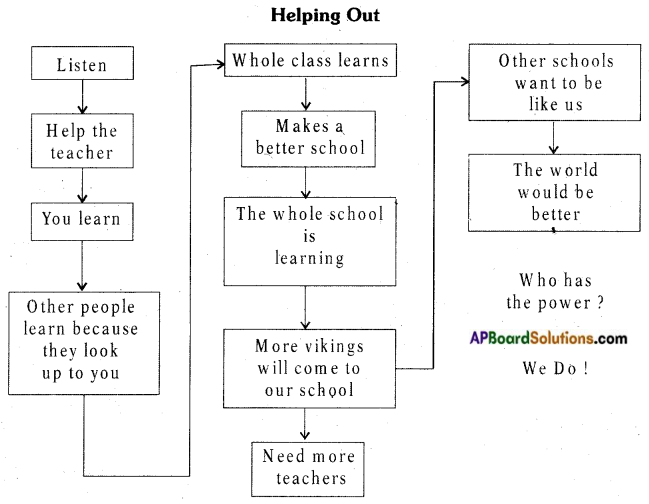
Now answer the following questions.
a) What does the flow chart show?
Answer:
The flow chart shows what children do at school to help out!
b) How do the other people at school learn?
Answer:
Because they look up to you learning.
Choose the correct answer from the choices given.
c) How can the school become better? ( )
i) When a boy gets 1st in class
ii) When the whole class learns
iii) When other schools do better
iv) When there is no progress
Answer:
ii) When the whole class learns
d) When do we need more teachers? ( )
i) When there is absence of teachers
ii) When pupils are absent
iii) When the headmaster needs more teachers
iv) When there are many pupils/students
Answer:
iv) When there are many pupils/students
e) What is developed in between schools? ( )
i) competition
ii) confusion
iii) war
iv) friendship
Answer:
i) competition
![]()
4. Observe the following flow chart.

Now answer the following questions.
a) What does it mean when you say there is no homework?
Answer:
You are lying.
b) What would you do if there is more time for completing homework?
Answer:
Watch TV, check E-mail, play games, have snacks, etc.
Choose the correct answer from the choices given.
c) If there is less time due for homework, what should you do?
i) sleep
ii) start working
iii) play games
iv) enjoy free time
Answer:
ii) start working
d) What is the meaning of ‘get a life’?
i) get a gift
ii) get a chance
iii) make it active
iv) waste your time
Answer:
iii) make it active
e) When does one lie, ‘there is no homework’?
i) When the student is not interested
ii) When the student wants to escape
iii) When there is no homework!
iv) When the student completes every work
Answer:
ii) When the student wants to escape
5. Observe the following table.
QUALITY ASSURANCE FOR SMALL-SCALE RURAL FOOD INDUSTRIES
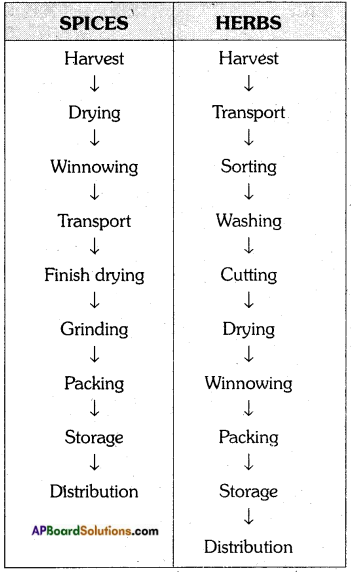
Now answer the following questions.
a) What does the table show?
Answer:
The table shows the quality assurance of the food products in rural areas.
b) What are the two food products processed in industries?
Answer:
1. Spices 2. Herbs
Choose the correct answer from the choices given.
c) What is done to the spices after winnowing? ( )
i) dried
ii) harvested
iii) transported
iv) ground into powder
Answer:
iii) transported
d) What is done at last after processing both the products? ( )
i) stored in containers
ii) distribution is done
iii) both are mixed
iv) kept for sale
Answer:
ii) distribution is done
e) When are the herbs transported? ( )
i) after winnowing
ii) after distribution
iii) after packing
iv) after harvesting
Answer:
iv) after harvesting
![]()
6. The following table tells us about, the population details of five villages. Study it and answer the questions given under.
| Name of the village | No. of families | Male | Female |
| Veerukonda | 321 | 390 | 500 |
| Alkapur | 765 | 766 | 813 |
| Suripadu | 704 | 960 | 900 |
| Rambedu | 412 | 390 | 389 |
| Velagalammapudi | 563 | 580 | 530 |
Answer the following questions.
a) What information can we get from the above table?
Answer:
Population details of five villages
b) Which village has the highest n umber of total population?
Answer:
Suripadu
Choose the correct answer from the choices given below.
c) Which village is in the second place in female population? [ ]
i) Veerukonda
ii) Alkapur
iii) Suripadu
Answer:
ii) Alkapur
d) The two villages with the same number of male population are [ ]
i) Velagalammapudi and Suripadu
ii) Rambedu and Suripadu
iii) Veerukonda and Rambedu
Answer:
iii) Veerukonda and Rambedu
e) Which of the following statements is true with reference to the information given above? [ ]
i) The number of males and females in Rambedu is almost equal.
ii) The number of females is higher than the number of males in Velagalammapudi.
iii) Alkapur has the lowest number of families.
Answer:
i) The number of males and females in Rambedu is almost equal.
7. Study the following tree diagram carefully.
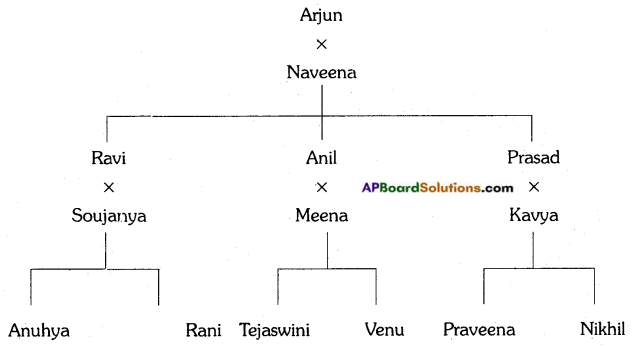
Now, answer the following questions.
a) Who is Meena’s mother-in-law?
Answer:
Naveena
b) How many granddaughters does Arjun have?
Answer:
Four
Choose the correct answer from the choices given below.
c) Praveena is the daughter of [ ]
i) Meena
ii) Ravi
iii) Kavya
Answer:
iii) Kavya
d) Venu and Nikhil are [ ]
i) brothers
ii) cousins
iii) friends
Answer:
ii) cousins
e) Which of the following statements is true with reference to the information given above? [ ]
i) Anil has two daughters.
ii) Anuhya and Rani are sisters.
iii) Kavya is Ravi’s wife.
Answer:
ii) Anuhya and Rani are sisters.
![]()
Section – B: Creative Writing
1. When the king made a bet with Tenali Raman that he had to paint a picture in one month, the courtiers were happy to find Tenali Raman in a fix. What could be the possible conversation between two courtiers?
Answer:
1st Courtier: A very good thing happened! I am very happy to see Tenali Raman in a soup.
2nd Courtier: Yah! You are right. Otherwise he feels too proud of himself.
1st Courtier: I know he doesn’t paint at all.
2nd Courtier: That’s true, but what is he going to do for a month.
1st Courtier: May be think of what to do. Any way I’m sure he would be punished.
2nd Courtier: But he Is very clever. We should wait and see what happens.
1st Courtier: Let us wait for a month.
2. When Tenali Raman went home, his wife asked him why he came home with paper and paints. Write a possible conversation between Tenali Raman and his wife.
Answer:
Tenali Raman: See what I brought home today.
Wife: Why did you bring these things home? We do not have children.
Tenali Raman: They are for me. I’m going to paint.
Wife: What! You are going to paint! What on earth made you think so?
Tenali Raman: Why are you surprised? I had a bet with the king.
Wife: Bet? For what?
Tenali Raman: I said I could paint as any other well-known artist.
Wife: But you do not know even to make a sketch?
Tenali Raman: I need’nt. The only thing I should know is imagination.
Wife: Imagine what?
Tenali Raman: The painting, the surroundings of the painting, the scenic beauty …….
Wife: Stop …… stop. I cannot understand you.
Tenali Raman: OK, you can see my painting after a month. Then you will understand my talent.
3. When the king sent away Tenali Raman off the court, he became thoughtful of Tenali Raman’s comments. Write a diary entry of the king.
Answer:
Dear diary,
What happened to Tenali Raman today. I know he is very good and talented at poems, jokes and funny things. But today he made a bet that he could paint! How funny? Did he joke as usual or serious ? But he could not bet with a king in a silly way. There must be something in his mind. He is very clever. He can do anything and prove himself right. Is he going to employ an artist to paint the picture ? No, no, he is not a cheater. Let me wait for a month and see if he can win the bag of gold.
Krishnadevaraya
4. The artist in Krishnadeva Raya’s court was hurt when Tenali Raman said the painting was not pleasing. When the king gave him the task of painting, he felt happy. Write the diary entry of the artist.
Answer:
Dear diary,
Today I was deeply hurt when Tenali Raman said my painting was not pleasing. What does he know about painting. How foolish it is to say that he should see the other side of the painting ! The king and all other courtiers were pleased with my work. Only Tenali Raman became the spoil in the game. But, the king, his Highness was very justful. He bet against Tenali Raman to make an equally beautiful picture. I’m so happy, Tenali Raman to be in a fix. But that man was very cool. He agreed for the bet and went home with the canvas and colours. Can he really make a painting and impress the king? Let me wait and see.
Artist
![]()
1. Write a letter to your sister in Guntur congratulating her on her success in Kabaddi.
Answer:
Sudarsan Buildings
Vinukonda
2.4.20xx
Dear Anu
How are you ? Very pleased to learn about your success in Kabaddi competitions.
I am fine and finished my Summative Exams. I am regularly going for volleyball practice to the stadium. When Mum, Dad and I knew you won in Inter-School Kabaddi competition, we felt very excited and happy. Congratulations ! We shall celebrate when you come here. When are you coming ? I am eagerly waiting for your arrival.
With love
Kanchana
Address on the Envelope:
To
R. Anusha,
1-134, Girls Hostel,
ZPHS,
Guntur.
2. Write a letter to your Headmaster requesting him for three days leave to visit your uncle’s place.
Answer:
Dt 2.4.20 xx
Ravi Kumar,
Class VII ZPHS
Ramavarappadu
VIJAYAWADA
The Headmaster
ZP High School
Ramavarappadu
Vijayawada
Sir
I bring to your kind notice that last night we received a call from our uncle’s place. He met with an accident and admitted in the hospital. Our family has to visit his place to be helpful to his family.
So kindly grant me leave for three days. I promise that I shall attend the Exams without fail.
Thanking you
Yours sincerely
Ravi Kumar
Class VII
(Parent’s Signature)
3. Your school is going to celebrate its Annual Day next month. You are going to dance for two songs. The local M.L.A will be the chief guest of the function. Many important people of the village will attend the programme. All the teachers are working very hard to make it a big success. Games are being conducted for the occasion.
Now, write a letter to your friend inviting him to attend the programme.
Answer:
Tenali.
10-3-xx.
Dear Ravi,
It has been a long time since I wrote to you. How are your parents? How are you? How is your little sister? I hope you are studying well. We are all fine here. I am also doing well here. In this letter I would like to describe you about our school Annual Day which we celebrate next month.
On 20th of April our school is going to celebrate the Annual Day. The local M.L.A. will be the Chief Guest of the function. Our Head Master will preside over the function. Many important people of the village will attend the programme. All the teachers are working hard to make it a big success. Competitions in games and sports are being conducted for the occasion, Many cultural activities are going to be held. I am going to dance for two songs. It is going to be a great fun and enjoyment.
Do you want to grab the fun and entertain yourself by attending our Annual Day? I would like you to be at the function. I am looking forward to seeing you here.
Convey my regards to your parents. Hoping you will turn up, I remain.
Yours lovingly,
x x x x x
Addres on the Envelope:
To
G. Suresh,
S/o G. Satish,
H.No: 8-95/A,
Sai Baba Temple Street,
Brahmin Street,
Nizam Patnam.
Guntur (Dt.)
4. Write a story using the following hints.
Crocodile and monkey.- friends – monkey gives fruits every day – crocodile gives the fruits to its wife – wife wants to eat the Heart of the monkey – crocodile invites monkey for dinner – asks monkey to sit on its back to swim across the river – on the way says it’s going to take out its heart – monkey says – put its heart on the tree – will go back and bring it – crocodile takes it back to the tree – monkey jumps to the bank-climbs the tree.
Answer:
Once there were a crocodile and a monkey. They were good friends. Monkey used to give fruits to crocodile every day. The,crocodile used to give these fruits given by monkey to his wife. His wife was a crooked one. She wanted to eat the heart of the monkey. She told her husband about her wish. At first the crocodile did not accept his wife’s proposal. With her repeated requests the crocodile had to accept his wife’s wish.
One day the crocodile invited the monkey to his home for dinner. Since his burrow is on the other side of the river they had to swim across the river. The monkey did not know how to swim. So the crocodile asked the monkey to sit on his back to swim across the river.
On the way the crocodile said that he was going to take out his heart. The clever monkey told the crocodile that it had put his heart on the tree. The monkey said that they would go back and bring it. Believing the monkey’s words the crocodile took the monkey back to the three. When they reached the bank the monkey jumped to the bank and climbed the tree. Thus the clever monkey saved its life from the crooked crocodile.
![]()
5. Write a story using the following hints.
Woodcutter – cutting tree – on river bank – axe slips – falls into water – woodcutter sad – river god appears from water – offers golden axe – woodcutter refuses – god offers silver axe – woodcutter refuses – god offers iron axe – woodcutter happy and accepts the iron axe – god very pleased – admired honesty of woodcutter – gives all the three axes.
Answer:
Once there was a woodcutter. One day he was cutting a tree on a river bank. When he was cutting down the branch his axe slipped and fell into water. The woodcutter was sad.
Then the river god came up from water and appeared before him. The god offered him the golden axe. The woodcutter refused saying that it was not his own axe. Then the god entered water and came up with a silver axe. When die god offered the woodcutter the silver axe he once again refused to accept it by saying that it was not his own axe.
Finally the god came up with the woodcutter’s iron axe. When the god offered him the iron axe the woodcutter happily accepted it. The god was very pleased. He admired the woodcutter’s honesty and gave him all the three axes – gold, silver and iron axes.
Moral: Honesty is the best policy.
Vocabulary
Choose the words with similar meaning from the list given to the words underlined.
1.
![]()
Tenali Raman was a poet and iester (a) in the court of King Krishnadevaraya of Vijayanagar. He was famous (b) for his wit and intelligence.
2.

One day, Raja Krishnadevaraya and his courtiers (a) watch as an artist shows his paintings to the king. The king and most of his courtiers are impressed (b) with the paintings;
3.
![]()
I can almost feel the peace (a) of the village scene. You are a very talented (b) artist.
4.
![]()
What an ignorant (a) fool you are! Everything cannot be painted. You must imagine (b) the bits that are missing.
5.
![]()
It’s only fair that if he doesn’t make good his boast (a), he should pay a penalty (b).
6.
![]()
It’s a magnificent (a) black stallion with a white star on its forehead. Look at the polished (b) leather saddle on it.
7.
![]()
Imagine that the rest of the horse is just outside the canvas (a) grazing at some lush (b) green grass.
Answer:
1. a) joker b) well-known
2. a) king’s ministers b) pleased
3. a) calm b) skilful
4. a) without knowledge b) think
5. a) speak great of oneself b) fine
6. a) wonderful b) shining
7. a) a cloth for painting b) thick and strong
![]()
Write the opposite words to the underlined words in the given paragraph.
1. That is really a beautiful (a) painting. I can almost feel the peace (b) of the village scene.
2. Your Highness is very kind (a). It will be an honour (b) to paint for Your Majesty.
3. What an ignorant (a) fool you are! Everything cannot be painted. You must imagine the bits that are missing (b).
4. I agree (a). After a month. I will show you a better (b) painting than that one.
5. Perhaps he’s so busy (a) with his painting that he has lost (b) track of the days.
6. It’s only fair (a) that if he doesn’t make good his boast, he should pay a penalty (b).
7. You old rascal, you have got the better (a) of me. Minister, where is that bag of gold? Give it to Tenali Raman, the cleverest (b) man in my kingdom!
Answer:
1. a) ugly b) din
2. a) cruel b) dishonour
3. a) innocent b) found
4. a) disagree b) worse
5. a) idle b) found
6. a) unfair b) reward
7. a) worse b) dullest
Fill in the blanks with the right form of the words given in brackets.
1. That is really a ——– (beauty/beautiful) (a) painting. I can almost feel the ——– (peace/peaceful) (b) of the village scene.
2. Your Highness is very ——– (kindly/kind) (a). It will be an ——– (honourable/honour) (b) to paint for Your Majesty.
3. What an ——– (ignorance/ignorant) (a) fool you are! Everything cannot be painted. You must ——– (imagination/imagine) (b) the bits that are missing.
4. I ——– (agree/agreement) (a). After a month, I will show you a better ——– (paint/painting) (b) than that one.
5. I wouldn’t be too ——– (certain/certainly) (a) of that. He really is very ——– (clever/cleverly) (b).
6. It’s only ——– (fairness/fair) (a) that if he doesn’t make good his ——– (boasting/boast) (b), he should pay a penalty.
7. This is very ——– (insult/insulting) (a). You’re trying to make a ——– (fool/foolish) (b) of me.
Answer:
1. a) beautiful b) peace
2. a) kind b) honour
3. a) ignorant b) imagine
4. a) agree b) painting
5. a) certain b) clever
6. a) fair b) boast
7. a) insulting b) fool
a) Complete the following words using ie, ei, ea, ee, ai, ou, io.
1. Raja Krishnadevaraya and his court _ _ rs watch as an artist shows his p _ _ ntings to the king.
2. That is r _ _ lly a b _ _ utiful painting.
3. I can almost f _ _ l the p _ _ ce of the village scene.
4. We shall be very pl _ _ sed if you can stay on at our c _ _ rt and make more beautiful paintings like these.
5. I wouldn’t be too cert n of that. Her lly is very clever.
6. Well, I can’t w _ _ t anymore. Somebody sh _ _ ld go to his house and tell him he has lost his
bet and the bag of gold.
7) It’s a magnificent black stall _ _ n with a white star on its foreh _ _ d.
8) Tenali comes in with two men carrying a p _ _ nting covered with a sh _ _ t of cloth.
Answer:
1. a) courtiers b) paintings
2. a) really b) beautiful
3. a) feel b) peace
4. a) pleased b) court
5. a) certain b) really
6. a) wait b) should
7. a) stallion b) forehead
8. a) painting b) sheet
![]()
b) Complete the words with the correct suffixes given in brackets.
1) Tenali Raman had a great imagina——– (sion/tion) in drawing pictures.
2) See what a beauti——– (ful/full) horse I have drawn.
3) If you don’t pay the fee in time, you should pay a penal——–(ty/ti).
4) This magnifi——– (sent/cent) hare is black in colour.
5) Tenali Raman was famous for his wit and intelli——– (gense/gence).
6) The court——– (iers/ears) disliked Tenali Raman.
7) What an igno——– (rent/rant) fool you are!
Answer:
1) imagination
2) beautiful
3) penalty
4) magnificent
5) intelligence
6) courtiers
7) ignorant
c) Find the wrongly spelt word and write the correct spelling.
i) promiss; imagine; clear; corner
ii) smartest; sertain; clever; court
iii) indeed; smiling; pleased; courtear
iv) wisper; eager; each other; tower
v) imagine; courtiers; lovily; everything
Answer:
i) promise
ii) certain
iii) courtier
iv) whisper
v) lovely
Put the following words under correct headings.
![]()
Answer:
| People | Things |
| 1) artist
2) courtier 3) soldier 4) minister |
1) painting
2) canvas 3) colours 4) paper |
a) Make sentences with the phrasal verbs given below
i) catch up
ii) part from
iii) lookout
iv) get through
v) get on
vi) look after
Answer:
i} catch up: Komal has to catch up with others in studies.
ii) part from: Sonam cried when she had to part from her parents.
iii) look out: Look out! The tiger is coming.
iv) get through: Mani worked hard and got through all the difficulties.
v) get on: You should get on with good and bad people.
vi) look after: Geetha looks after her little brother, when her mother goes out.
![]()
b) Guess the meaning of the idioms below and use in your own sentences.
i) a hot potato
ii) at the drop of a hat
iii) ball is in your court
iv) be glad to see the back of
v) costs an arm and a leg
Answer:
i) a hot potato: To get first in class is like a hot potato.
ii) at the drop of a hat: After packing everything, we are at the drop of a hat.
iii) ball is in your court: Do you want to buy a cake or pastry? Now the ball is in your court.
iv) be glad to see the back of: We are happy to see the back of the other team.
v) costs an arm and a leg: It costs an arm and a leg to go across with my neighbour.
Grammar
Read the following passage and correct the parts underlined. Rewrite the corrected parts in the space provided.
1. That is really the (a) beautiful painting. I can almost feeling (b) the piece (c) of the village scene. You are a very talent (d) artist.
2. For one thing, where is an (a) other side of these too (b) men? You can only sea (c) there (d) one side.
3. You may also take live (a) from the court at (b) a month. If on (c) the end of the month you bring me a painting that half as good for (d) the ones we saw today, I promise you a bag of gold and the title ‘King of Artists !’
4. Sir, the day has arrive (a) when Tenali Raman show (b) you her (c) painting. He’s so busy for (d) his painting that he has lost track of the days.
5. It’s a magnificient (a) black stallion of (b) a white star on its fourhead (c) Look at the polish (d) leather saddle on it.
6. This is very insult (a). You’re trying to made (b) a fool at (c) me. There is nothing of (d) this canvas.
Answer:
1. a) a
b) feel
c) peace
d) talented
2.
a) the
b) two
c) see
d) their
3. a) leave
b) for
c) at
d) as
4.
a) arrived
b) shows
c) his
d) with
5. a) magnificent
b) with
c) forehead
d) polished
6. a) insulting
b) make
c) of
d) on
![]()
Complete the passage choosing the right words from those given below. Each blank is numbered and for each blank four choices (A), (B), (C) and. (D) in the blanks.
1. That is really a ________ (1) painting. I can almost feel ________ (2) peace of the village scene. You are ________ (3) very talented artist. Here is a bag of gold ________ (4) you.
1) A) beautiful B) beauty C) most beautiful D) beautifullest
2) A) a B) of C) an D) the
3) A) the B) a C) all D) very
4) A)to B)of C)for D)in
Answer:
1 – A; 2 – D; 3 – B; 4 – C
2. What ________ (1) ignorant fool you are! Everything cannot (2) painted. You must _________(3) the bits that ______ (4) missing.
1) A) a B) an C) th D) one
2) A) be B) will C) is D) was
3) A) imaginary B) imagines C) imagine D) imagination
4) A) is B) are D) may be C) will be
Answer:
1 – B; 2 – A; 3 – C; 4 – B
3. The courtiers start _______ (1) thinking that he would lose ________ (2) bet. They _________ (3) Tenali Raman cannot paint at all. Tenali looks _________ (4) the giggling courtiers angrily and walks out.
1) A) smile B) smiled C) smiling D) smiles
2) A) the B) a C) one D) an
3) A) knew B) knows C) know D) knowing
4) A) for B) at C) by D) on
Answer:
1 – C; 2 – A; 3 – C; 4 – B
4. Well, I can’t________ (1) anymore. Somebody should go ________ (2) his house and tell him _________ (3) he has lost his bet and the bag _________ (4) gold.
1) A) waiting B) waited C) waits D) wait
2) A) to B) for C) by D) with
3) A) because B) so C) hcnce D) that
4) A) and B) of C) with D) for
Answer:
1 – D; 2 – A; 3 – D; 4 – B
5. Sir, see what a beautiful horse I ____ (1) drawn. It’s a magnificent black stallion with ________ (2) whitestar on – (3) forehead. Look ________ (4) the polished leather saddle on it.
1) A) am B) have C) has D) was
2) A) the B) an C) a D) one
3) A) it B) its C) her D) their
4) A) at B) on C) with D) for
Answer:
1 – B; 2 – C; 3 – B; 4 – A
6. Well, you ________ (1) the one who told me that we had to use ________ (2) imagination when we looked at paintings. Imagine that _________ (3) rest of the horse is just outside the canvas _________ (4) at some lush green grass.
1) A) will be B) are C) were D) may be
2) A) our B) its C) their D) my
3) A) a B) very C) the D) an
4) A) graze B) grazing C) grazed D) is grazing
Answer:
1 – B; 2 – A; 3 – C; 4 – B
![]()
Read the following sentences and say what they mean.
A) Choose the right answer from the choices given.
1. You will wait here, won’t you? ( )
A) confirmation
B) request
C) order
D) suggestion
Answer:
A) confirmation
2. Do exercises every day to be fit. ( )
A) Order
B) Advice
C) Wishes
D) Suggestion
Answer:
B) Advice
3. Many happy returns of the day. ( )
A) Request
B) Statement
C) Blessings
D) Wishes
Answer:
D) Wishes
4. You may get inside. ( )
A) giving permission
B) taking permission
C) rejecting permission
D) request
Answer:
A) giving permission
5. Where is the Goddess Durga’s temple? ( )
A) suggestion
B) exclamation
C) seeking information
D) giving information
Answer:
C) seeking information
![]()
B) Rewrite the sentence with contract form wherever possible.
1) Ram is not coming today.
2) They are not leaving for any business.
3) I have many pets at home.
4) We are planning for a day’s outing.
5) Nora could not climb the wall.
Answer:
a) Ram isn’t coming today.
b) They aren’t leaving for any business.
c) I’ve many pets at home.
d) We’re planning for a day’s outing.
e) Nora couldn’t climb the wall.
C) Fill in the blanks with Adverbs of manner. The words are given in the brackets.
1. My brother completed his homework ——– (quick).
2. The teacher asked the question ——– (loud).
3. Rina did ——– in the Exams. (good)
4. The children entered the restaurant ——– (noise).
5. Mona asked for a bicycle ——– (pleasing).
Answer:
1. quickly
2. loudly
3. well
4. noisily
5. pleasingly

